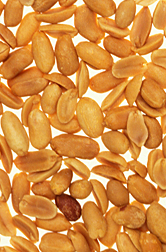This page has been archived and is being provided for reference purposes only. The page is no longer being updated, and therefore, links on the page may be invalid.
Heat and Pressure Treatment May Affect Allergenic Proteins in Peanuts
By Rosalie Marion Bliss
February 10, 2014
U.S. Department of Agriculture (USDA) scientists and their colleagues found that when they applied heat and pressure to roasted peanuts, there was a significantly reduced allergic reaction from the proteins in these peanuts.
For the study, Agricultural Research Service (ARS) chemist Soheila Maleki, with the ARS Food Processing and Sensory Quality Research Unit in New Orleans, La., worked with first author Beatriz Cabanillas of the Hospital Universitario 12 de Octubre in Madrid, Spain, and other researchers. ARS is USDA's chief intramural scientific research agency.
Previously, Maleki had found that while people generally eat peanuts that have been roasted or boiled, the extracts that are commonly used to diagnose peanut allergies are from raw peanuts. She and colleagues also have shown that roasting-induced side reactions, such as browning, increased the amount of antibody that recognizes and binds to major allergenic proteins (allergens), when compared to the amount that binds to allergens from raw peanuts.
The process the researchers used to apply heat and pressure is called autoclaving. It involves a higher moisture environment—similar to steaming or boiling—than roasting. As a result, autoclaving does not initiate the browning effect that comes with roasting. The less allergenic reaction to the peanuts exposed to heat and pressure was confirmed by skin-prick tests.
The teams' experiments also showed that in the autoclave-treated peanut samples, proteins became unfolded, which makes them easier to digest. Although further studies are needed to assess the clinical relevance of the findings, the researchers concluded that autoclaving at 2.56 atmospheres for 30 minutes produces a significant decrease of antibody-binding capacity of peanut allergens. The study was published in Food Chemistry.
Read more about this research in the October 2013 issue of Agricultural Research magazine.

